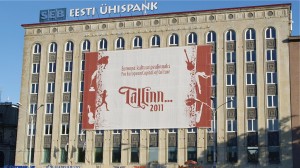
One of the few outdoor advertisements for the Tallinn 2011 Capital of Culture currently up. Photo by Raymond Crowley.
TALLINN — The EU’s culture capital envoy’s visit to Estonia this week cleared up a 23.5 million krooni (€1.5 million) funding question mark for the Tallinn 2011 European Capital of Culture project.
Sir Robert Scott, the European Union project monitoring representative, paid a visit to Tallinn on Monday to inspect what is going on with Tallinn 2011 Culture Capital project funding after Tallinn was not granted with 23.5 million krooni Mercury Prize from the EU in April. Turku, Finland, the other 2011 culture capital did not have any such problem.
The foundation’s representatives went to Brussels on April 28 to meet the European Commission’s Capital of Culture monitoring division, but while the program was greeted with applause the prize money was not given. Back then the problem stood between the Tallinn municipal and national governments’ inability to write a guarantee letter for equal funding. Both the city and the state had promised to commit 50 million krooni (€3.3 million) for the 2011 budget.
However, during Scott’s meetings with Tallinn Mayor Edgar Savisaar and the Minister of Culture Laine Jänes, it was revealed that Brussels will not require a guarantee letter after all, but only the government’s and Tallinn municipal government’s cooperation letter on culture capital project funding.
“They don’t ask for such guarantee which says that this and this number is in the budget,” Jänes told Estonian Public Broadcasting (ERR) news program. “Scott clearly understands that we cannot give such guarantee if the national budget has not been approved in the parliament.”
Scott told the ERR news program that the EU probably will not have problem to pay the €1.5 million in support funding for the project. A final decision will be made in September.
Tallinn2011 press spokesman Andri Maimets said that the uproar in the Estonian press earlier this month over the funding was premature.
“The commission wanted to have more clarity on what’s happening in Tallinn and that’s what Scott was here for,” Maimets told Baltic Reports. “He understood the procedures of Tallinn municipal government’s and state budget, and also that both sides are ready to financially contribute into the program.”
Poor promotion
During his visit Scott was critical of the lack of outdoor advertising in Tallinn promoting the Capital of Culture project and events.
“It’s getting late! It is June 2010 now, and the only advertisement I have seen on the streets or in the environment of Tallinn is the side of Estonian Air’s airplane,” Scott told the ERR news program.
Scott explained that he is looking forward to see big flags and big notices, banners saying Tallinn 2011 European Capital of Culture.
“The ceremony is six months away, I hope that Tallinn has a sense of urgency. That’s what I’m concerned about,” he said.
In response, Maimets said the foundation has chosen modest promotion as there is only so much money and there is no reason to waste it.
“This is a planned step as we are not among the richest capitals of culture,” said Maimets. “The first half of the year was spent on foreign marketing.”
Tallinn2011 is mostly promoting the event abroad in cooperation with Istanbul, one of the current culture capitals and in Finland, Estonia’s main supplier of tourists.
Maimets promises that billboards and big advertisements will appear in Tallinn in September this year.
This article is free to view. To read Baltic Reports’ subscription-only articles, click here.












